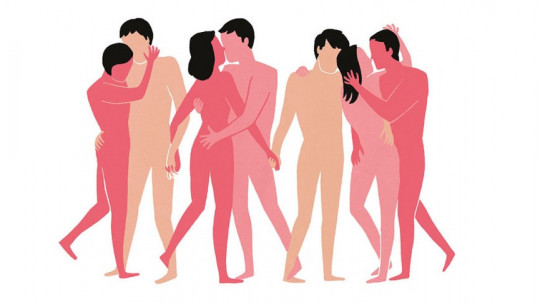Our Western society historically accepted diversity in love and sexual relationships; currently, space has been given to controversial and expanded ways of bonding beyond traditional monogamy. Polyamory and open relationships are two other alternatives for sexual and/or emotional commitment that challenge the conventional norms established by monogamy and most religions
Although it may not seem like it, both Polyamory and open relationships share some similarities; They also present differences. In this article, we will explore the distinctive characteristics of each approach, how they can affect the people involved and guide your emotional and sexual choices.
Monogamy, the social norm
The most conventionally accepted form of relationship in our Western societies is Monogamy. Emotional and sexual exclusivity between two people is established as a pact where fidelity between them is assumed. The fundamental values in monogamous relationships can be culturally prescribed through the commitment of marriage or personal choice may vary in their interpretation, individual experiences, and exercise depending on culture, family systems, and individual beliefs.
Infidelity is considered a serious violation of trust, respect, and commitment that is always painful in relationships, especially for those who felt betrayed; It can have significant emotional, sexual, and psychological consequences for all parties involved.
Romantic love encourages that; sexual intimacy and emotional commitment be exclusive and only between two people under the promise, the decision to maintain and work on the long-term relationship at the cost of all difficulties, challenges, conflicts and everything that the pact of exclusivity and tolerance could imply. because “true love endures everything, endures everything and can do everything”, with the non-negotiable possibility of allowing freedoms of any kind because: “You are mine, I am yours and we do what the social commandments and/or the Church say because that is our pact.”
We are automatically part of each other’s private property. This may also imply bending and even allowing acts of violence and hostilities that may occur in the relationship, whether sexual, emotional, psychological, financial, physical, etc. Where the majority of expectations surpass reality and human nature as the determining gender roles: The man must be, he has to have and the woman must be, he has to have… That pathological jealousy is an excessive love and we must be patient with it, nor provoke him. That individual spaces are an attack on the relationship. That the whore is the lover, the officer is the lady. That children are the basis of marriage. That what is yours is mine, what is mine is yours. That a good and decent woman cannot be unfaithful. That male infidelity is normal, because if she looks for it outside it is because she is missing it at home. That sexual abuse does not exist in dating relationships and much less in marriage because it is a duty to fulfill the task.
If one of the two wants, the other then too. And he is obliged to be accommodating and “let himself be loved.” The cult of insecurity, fear, control over the other is the correct behavior to protect fairy tale love and the image before society of a happy, stable and lasting relationship that has been “strong” and has been able to face God’s tests to prove that we are perfect for each other Does this sound familiar to you?

Why does infidelity hurt so much?
Pain is both a physical and emotional experience of losing something valuable. In the case of relationships, pain is produced by the loss of the ideal and the expectation that we build in our minds with each other. Infidelity is the breaking of the pact of loyalty and mutual commitment in any type of relationship that, although it may be subjective at the same time, some call it “Microinfidelities”: Like hiding the relationship.
For someone, flirting with another person may be infidelity, for another it may not be. Going out to eat with someone else can be infidelity, but not for someone else Having sexual interaction with someone else may not be considered infidelity to another; You may consider it infidelity if there is emotional attachment, etc.
It all depends on what each person defines as infidelity based on their belief system. The reality is that infidelity is a multifactorial decision that generally involves the inability to communicate, lack of trust and interest in the partner, and expressing needs or disagreements. There is an escapist need to face the current situation as a couple. Sometimes due to narcissism and the desire to receive other people’s desire.
Feeling desirable is not only sexual, there are also emotional voids. The taboo that implies having an alternate, hidden relationship, the desire for what is prohibited according to monogamous norms with the minimum emotional responsibility that a conscious relationship requires, assuming responsibility for decisions, actions and that such have a generally painful and traumatic impact on the other
Polyamory, loving multiple ways
Polyamory, on the other hand; involves the possibility of becoming romantically and sexually linked with more than one person at the same time, with the knowledge and consent of all parties involved. Polyamory encourages honesty, clear, open communication and the management of inevitable jealousy and personal insecurity.
It is about establishing agreements based on personal and emotional responsibility, accepting that the possibility that one or the parties may fall in love with one or the rest of the people involved with everything that this implies on an emotional, sexual, psychological and even energetic level.
The Open Relationship basically encourages free sexual interaction outside the mainly consolidated relationship, with people with whom an emotional bond is not necessarily involved. These types of relationships can be more focused on sexual satisfaction or exploring new experiences with different people.
Open relationships can have different rules and boundaries, which at the same time can be temporary or permanent. The Conscious Relationship is the type of relationship we choose to have with other person(s) of any kind. Monogamous, Polyamorous, Free etc. with own standards, with limits ; also with the possibility of negotiating and giving in on some things that nourish personal development and the relationship.
It is a realistic relationship and not based on the imagination of Prince Charming or the search for the Princess to rescue. That love is not always eternal and that it accepts that love could end, transform or be absent during the bond where it involves total emotional and communicative nudity to talk about what is expected, wanted, desired.
The type of relationship where it is talked about, agreed upon from the beginning and each party knows that Hollywood and Disney stories look great on screen. That personal and emotional responsibility is a pillar for a relationship to be truly healthy, meaningful, edifying and not where when speaking in old age it is: “We are together. But everything I had to endure and at what price” be the medal of suffering Everything changes, our relationships too. Choose the one that resonates with us. Healthy, free, deeply meaningful relationships that do not cost us pleasure, peace, life or mental health.










